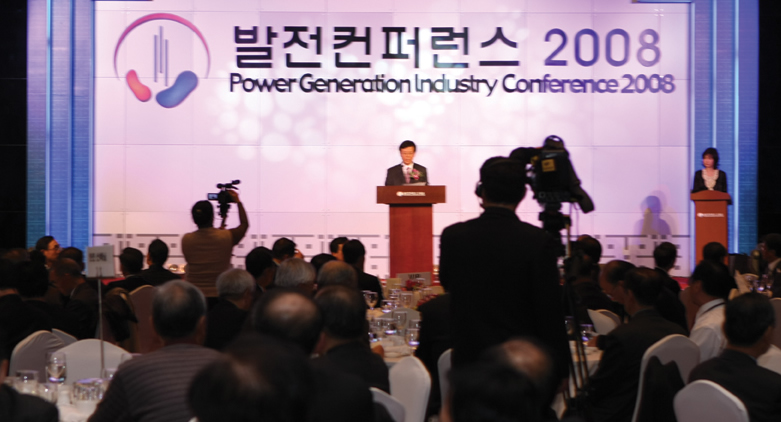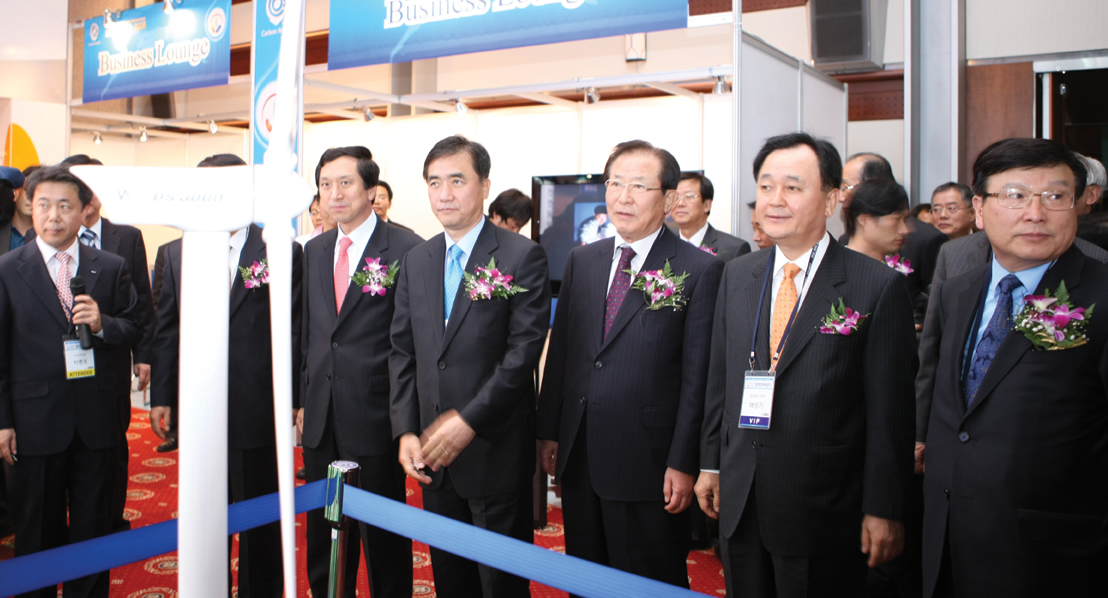Power Generation Industry Confab
Int'l Event confirms power industry's role as key to economic development and needs for further upgrading technology



Korea East-West Power Co. (EWP) hosted the Power Generation Industry Conference 2008 with the support of the Ministry of Knowledge Economy on Nov. 20-21 at the Grand Ballroom of COEX in southern Seoul.
Joining EWP, an affiliate of the Korea Electric Power Corp. (KEPCO), were all power plants affiliated with KEPCO led by Korea Hydro-Nuclear Power Co., Korea South-East Power Co., Korea Midland Power Co., Korea Southern Power Co., Korea Western Power Co. and Korea Power Exchange as co-hosts to the international event with a major theme of "Join the Future Energy Technology."
President Lee Gil-gu of EWP in his opening speech for the event said the power industry is a core principle artery of the nation's economy and is also the starting point of the power generation industry with the development of its technology meaning a high degree of the national economy.
The conference is the fifth one held annually so far and is designed to upgrade by a notch the level of power generation technology and promote closer cooperation among the industrial, academic and research sectors by building a base for such efforts. President Lee also said the event was inaugurated to share designing, production and operation technologies between makers and users. EWP has been working hard to turn the conference into a stage where Korean power companies and their counterparts share advanced power generation technologies.
Due to such an effort, many more private power companies participated in the gathering than before to expand the scope of the exchange. Power companies from such advanced countries as the United States, Britain and Japan had their representatives make keynote speeches at the meeting, making the gathering a truly international conference for the power generating industry.
"We expect the conference to continuously develop in such a way as to keep its status up as truly an international meeting in both style and substance," said President Lee.
At the same time, he hoped that the Korean power industry would be able to upgrade its technologies a notch and help Korean power companies join their global counterparts in all aspects of power generation. He hoped that the event participants would do their best to turn the gathering into a festive stage for harmony and unity among those working for power generation plants. He again expressed his appreciation for the MKE and those in the power industry for their cooperation to make the conference such a successful event.
Ahn Chul-shik, deputy assistant minister of the Ministry of Knowledge Economy, in his keynote speech, said the post-Kyoto system will formally be launched in 2013 based on the Declaration on Earth Warming at the summit of the 16 heads of state in July, which took up various problems related to climate warming in its agenda. In his speech entitled "The Direction of Government Industrial Policy," he said that the government will set up a target for the reduction of greenhouse gas, strategies for green growth through low-carbon energy mix policies, policies for green energy power generation and the development of the carbon market.
The government will also seek ways to turn the country into a low energy-consumption society and search for factors, proper energy mix and results from targets set for various energy saving policies.
Tom Key, a researcher with the Electric Power Research Institute (EPRI) in the United States, spoke on the development of new renewable energy and its future outlook. He said innovations in renewable energy technology are becoming more important as worldwide needs for affordable, reliable and clean energy grow, and concerns over energy and climate change mount.
The importance of a carbon-constrained future has become very clear. The EPRI is committed to the research and development needed for new generation technologies. And for the effective integration of these technologies into the electric grid, he said.
Renewable energy resources are globally abundant and many generation technologies are proposed to harness these resources for the production of electricity. Some of these technologies such as wind are in a full deployment stage and others such as concentrating photovoltaic and wave energy services are still in the development stage. On a theoretical basis, the worldwide renewable resource base could satisfy global demand for energy services many times over, yet the promise of renewable remains unrealized in Korea and in the United States, where non-hydropower renewable generation currently accounts for only about 1-2 percent of electricity.
In the next 10 to 15 years, this portion of renewable generation is expected to increase as by as much as ten times, Key said.
Geoffrey Morrison of the IEA Clean Coal Center, warned in his keynote speech that the global energy system is on an increasingly unsustainable path. China and India are transforming the global energy system by their sheer size. Therefore, the challenge for all countries is to achieve the transition to a more secure lower carbon energy system, he said.
New policies now under consideration would make a major contribution, he said, adding that the next 10 years are critical in that the pace of capacity additions will be most rapid, technology will be "locked-in" for decades, there will be a growing tightness in oil and gas markets and the challenge is global so solutions must be global.
Dr. Kim Jong-hyun, chair professor in the Department of Nuclear and Quantum Engineering at KAIST, said in his keynote speech that a carbon-constrained system, with all its potentially disastrous ramifications, is here to stay. In order to prevent more catastrophic consequences that are forecast, we must act now, he said. Technical potential exists for the electric power industry to significantly reduce its CO2 emissions over the next several decades. No one technology will be a silver bullet, a full portfolio of technologies will be needed. He went on to say that much of the needed technology isn't available yet and substantial R&D and demonstrations are required. This lecture brings the issue of carbon emission into focus and identifies the enabling technologies that can reduce carbon emissions to the pre-1990 level by 2030, he said. nw
Dignitaries present at the Power Generation Industry Conference 2008 cut ribbons to open the event held in Seoul Nov. 20-21. They are Pres. Kim Jong-shin of Korea Hyro and Nuclear Power Corp., Rep. Chung Jang-sun of the National Assembly Knowledge Economy Committee, Deputy Minister Ahn Chung-shik of MKE Energy and Resources Policy Office.
(from left) Photo above is a scene from the Power Generation Industry Conference 2008 held at Coex, southern Seoul. Photo below is a group of CEOs of power industry participating in the conference.
3Fl, 292-47, Shindang 6-dong, Chung-gu, Seoul, Korea 100-456
Tel : 82-2-2235-6114 / Fax : 82-2-2235-0799